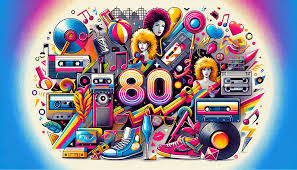Pop culture has been a significant part of our daily lives for decades, evolving with technology, fashion, music, and entertainment. The impact of pop culture can be seen in various aspects of society, from television and movies to the music we listen to and the trends we follow. Over the years, we have witnessed major transformations in how pop culture is created and consumed, and today, it continues to shape the way we live. This article will explore the evolution of pop culture from the 1980s to today, its major influences, and how it continues to shape the future.
The Rise of Pop Culture in the 1980s
The 1980s marked a pivotal time for pop culture, as it saw the rise of some of the most iconic music, movies, and TV shows. This decade witnessed the birth of music genres like MTV music videos, the popularity of synthesizer-driven pop, and the explosion of hip hop culture. The impact of influential figures like Michael Jackson, Madonna, and Prince cannot be overstated. Movies like “E.T.” and “Back to the Future” captured the imagination of audiences, while television shows like “The Cosby Show” and “Miami Vice” became cultural touchstones. In essence, the 80s laid the foundation for what pop culture would become in the decades that followed.
The 90s: The Golden Age of Television and Grunge
In the 1990s, pop culture saw a shift with the rise of grunge music and the continued expansion of television as a primary form of entertainment. The explosion of alternative rock bands like Nirvana and Pearl Jam introduced a new, raw sound that contrasted with the glam of the 1980s. The internet also started to take root, and as it did, it influenced how we accessed pop culture, setting the stage for the internet age. TV shows like “Friends,” “The Fresh Prince of Bel-Air,” and “The X-Files” became household names, while Hollywood blockbusters such as “Titanic” and “The Matrix” solidified the 90s as a golden era for the entertainment industry.
The 2000s to 2010s: The Age of Social Media and Celebrity Culture
As we entered the 2000s, the internet became an even more powerful tool in shaping pop culture. The rise of social media platforms like Facebook, Twitter, and YouTube gave everyone the opportunity to create and consume pop culture. Celebrities like Beyoncé, Justin Timberlake, and Kanye West became not just musicians but global icons influencing fashion, politics, and culture. The world saw the meteoric rise of reality TV with shows like “Keeping Up with the Kardashians” and “The Bachelor,” which turned ordinary individuals into stars. During this period, streaming services like Netflix and Hulu began changing the way we consume television, paving the way for binge-watching culture.
Pop Culture Today: Streaming, Diversity, and Global Influence
In today’s world, pop culture has gone global, with streaming platforms like Netflix, Disney+, and Spotify becoming dominant forces. The influence of social media has only grown, and platforms like Instagram and TikTok have revolutionized how we discover music, fashion, and trends. There’s also been a shift towards diversity and inclusion, with a broader range of voices and experiences being represented in mainstream entertainment. From K-pop to superhero franchises, global influences are more interconnected than ever before, making pop culture a diverse and fluid entity that reflects the world we live in.
Conclusion
Pop culture has come a long way since its early days, and its evolution continues to shape the world we live in today. From the MTV-driven 1980s to the global streaming culture of today, entertainment, music, and fashion have played a crucial role in defining each era. The rise of social media and global connectivity has made pop culture more accessible, diverse, and influential than ever before. As we move forward, it’s clear that the boundaries of pop culture will continue to blur, and its impact on society will only grow. The way we consume and create pop culture may change, but its importance in shaping our identity, values, and social movements remains undeniable. The future of pop culture is bright, and it’s exciting to imagine where it will go next.



